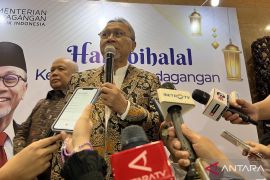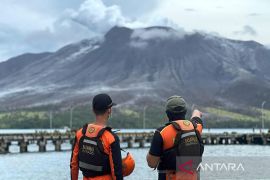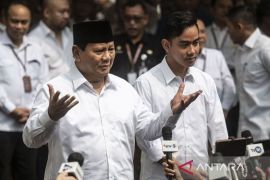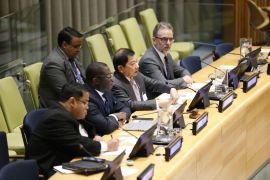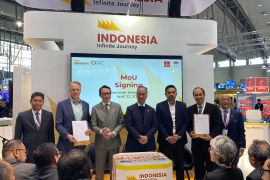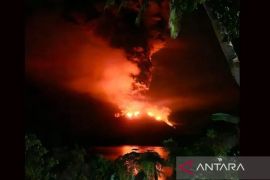"The Government of Indonesia has a commitment to keep the forest, but the big question is whether the commitment is put into effect or not," Greenpeace Indonesia Forest Campaigner Yuyun Indradi said.Jakarta (ANTARA News) - Indonesian President Susilo Bambang Yudhoyono in May 2013 extended the country`s forest moratorium but it was considered overlapping.
It was a courageous decision that the president has made as one of the efforts to reduce emission from deforestation and forest degradation by preventing new clearing of primary forests and peat lands for another two years.
But Greenpeace Indonesia Forest Campaigner Yuyun Indradi said in Jakarta on Sunday that the moratorium overlaps with 5.5 million hectares of forests that have been granted as concession areas for development to pulp wood or oil palm plantations, and selective logging or mining.
He also said that more than 600,000 hectares of peat lands and premier and secondary forests were rich in carbon content but they have been excluded from the latest moratorium map.
Therefore the Greenpeace Indonesia asked the government to firmly carry out its commitment of forest moratorium because thousands of hectares of premier and secondary forests in the country do not have legal protection.
"The Government of Indonesia has a commitment to keep the forest, but the big question is whether the commitment is put into effect or not," Yuyun noted.
He pointed out that based on Greenpeace International`s analysis of the government`s recent revision of Indicative Map Concerning the Suspension of New Licenses for Forests and Peat lands (PIPIB), more than 10 million hectares of premier forests and around 32 million hectares of secondary forests in Indonesia still do not have any legal protection.
"The forest moratorium map is revised every six months, but the problem we find is that it sometimes seizes the moratorium area," Yuyun said.
Indonesia`s forests cover around 70 percent of the total land area, which include marine parks, protection forests, conservation forest, production forest, and convertible production forest.
The country is known as one of the world largest tropical forest areas and one of the most species diverse countries with its biodiversity comprises of 10 percent of total world plant species and 17 percent of wild animal species.
Internationally, Indonesia is also known as one of the leading country of world`s climate change issues and has taken serious climate change problem through various possible means.
But Greenpeace Indonesia Forest Campaigner pointed out that the total decline in the legally protected forest area under the moratorium since 2011 has reached 6 million hectares.
Such a condition, according to Yuyun, was vividly contrary to the commitment of the President Susilo Bambang Yudhoyono who earlier told Greenpeace Indonesia to try harder to strengthen environmental protection.
Therefore, he has asked the government to review the existing concessions, to increase transparency in the way the licenses are granted, to establish a credible database of low-carbon land as an alternative to the current destruction of the high-carbon land, and to undertake clear spatial and land use planning.
Anyway the Greenpeace has expressed support to President Yudhoyono`s steps to protect biodiversity in the country.
"President Yudhoyono deserves congratulations on the progress made during his administration, the progress that has led to the protection of forests he made," Greenpeace International executive director Kumi Naidoo said when the head of state visited Rainbow Warrior ship at Tanjung Priok port early this month.
At the time Kumi said said the homework of preserving the environment had not yet finished but Greenpeace had appreciated various measures that President Yudhoyono had taken.
"Obviously crucial homework still has yet to be finished and we in the Greenpeace are fully supportive to the Indonesian government`s commitment to materializing forests without deforestation," he said.
He expressed hope that the President would continue supporting and providing a room for the creation of strong and dynamic civil societies in the framework of protecting the environment to assure a better future.
Meanwhile, President Yudhoyono said Greenpeace was the partner of Indonesia in preserving the environment for a better future of the nation.
"I ask Greenpeace to remain the partner of Indonesia with its task to remind and criticize Indonesia of things that the country has to improve," President Yudhoyono noted.
According to him, the government of Indonesia has a high commitment to preserving the environment through various programs that have been carried out.
Yudhoyono said that through its forestry sector, Indonesia has set itself a target to reduce its carbon emission by 26 percent by 2020 by preventing deforestation and protecting the forest for lumber.
The president also mentioned that the Government had carried out moratorium on deforestation and executed the program of planting one billion trees annually.
Speaking about the extension of the forest moratorium, Andrew Steer, the President and CEO of the World Resources Institute in its website http://insights.wri.org, said recently that it was a bold decision by a leader known for his commitment to sustainability.
"Extending the moratorium is a victory for the Indonesian people, business, and the planet. The moratorium will directly benefit more than 80 million Indonesians who rely on forests for their livelihood," Andrew Steer said.
He said President Yudhoyono`s leadership sent an important signal well beyond Indonesia`s borders that protecting forests was both an ecologically and economically smart strategy.
Steer added that the extension of the moratorium was certainly not the end of the story.
"The new law needs to be implemented more effectively than its predecessor. The government should strengthen its efficacy though better technical guidance and outreach at the local level; improved monitoring and enforcement; and better cooperation among ministries," he noted. (*)
Reporter: Otniel Tamindael
Editor: Heru Purwanto
Copyright © ANTARA 2013



